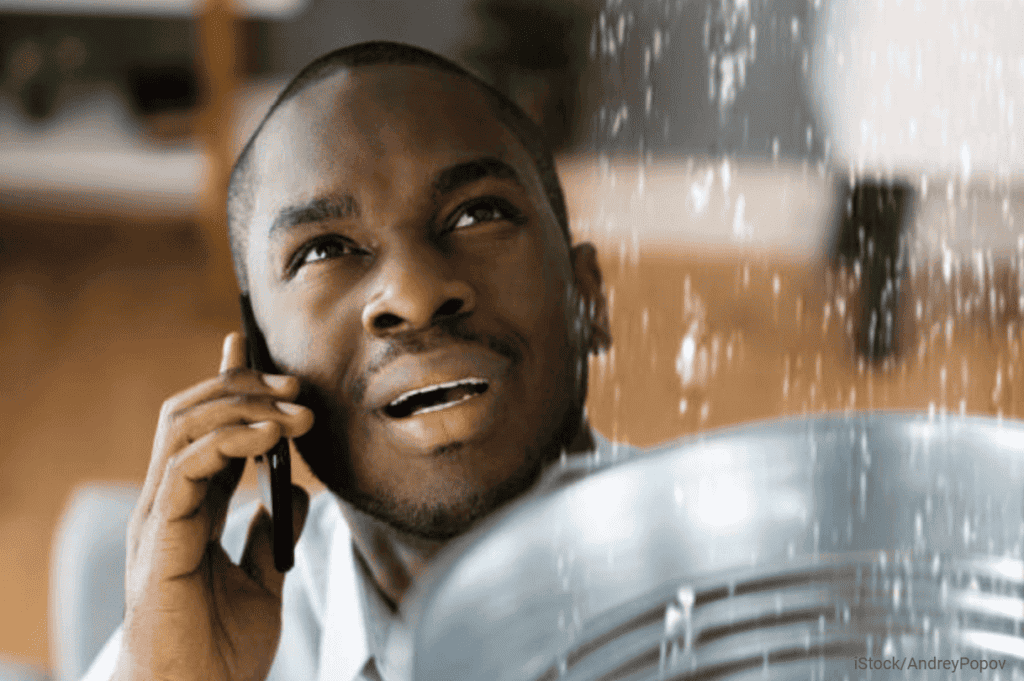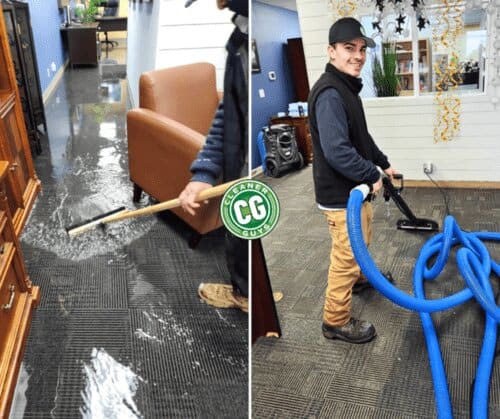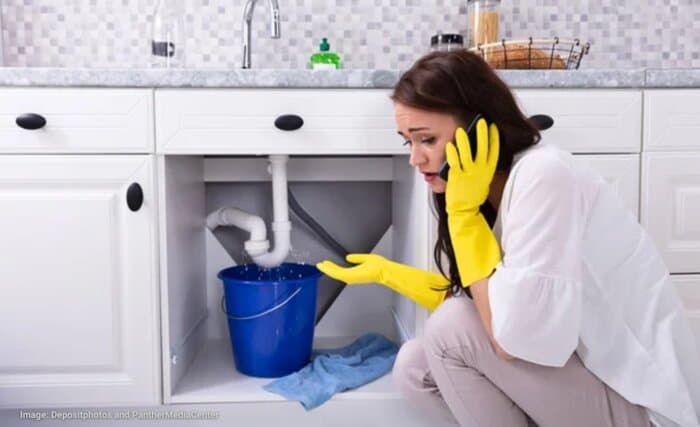Discovering water damage in your apartment can be an awful moment of panic! Where did it come from? Can you fix it? Do you have to pay for it, or does your landlord? All these questions and more are answered here, by professional water damage experts. We’ve seen this scenario time and time again. We’re Cleaner Guys, and we’re here to tell you what to do about water damage in an apartment.
Table of Contents
- What is Water Damage in an Apartment?
- What to Do About Water Damage in an Apartment
- Who is Responsible for Water Damage in an Apartment?
- Will My Renter’s Insurance Cover Water Damage?
- Who Fixes Water Damage in Apartments?
- How to Prevent Water Damage in an Apartment
What is Water Damage in an Apartment?
Water damage is the spoiling or destruction of materials and property by uncontrolled water. The most common sources of water damage in an apartment are:
- Leaking plumbing, including under sinks and in walls and ceilings.
- Leaking appliances, such as refrigerators and washing machines.
- An overflowing sink, toilet, or bathtub.
- A natural disaster, such as a hurricane or a flood.
- Frozen pipes bursting.
- A leaking roof.
Is Water Damage in an Apartment Dangerous?
Water damage in an apartment is not usually dangerous in and of itself. However, water damage left unmitigated can cause mold, and mold can be very unhealthy, and even dangerous. Water damage can sometimes be dangerous if it saturates a floor or ceiling enough to cause it to soften. We here at Cleaner Guys got a call from a man just recently whose refrigerator leaked so long, his dog fell through the kitchen floor because it was so softened by water!
Water damage should be taken care of immediately, and not left alone in hopes that it will take care of itself. It won’t.
What to Do About Water Damage in an Apartment
The following are the very first steps you should take when you discover any kind of water damage in your apartment.
- Find the source of the water and stop it if you can.
- Remove any personal items from the water.
- Record the damage extensively. This will be key to proving whether the water damage was your fault or the landlord’s.
- Start soaking up any standing water if you can, with towels, blankets, buckets, etc.
- Call your landlord, explain the situation, and request maintenance/repair.

Who is Responsible for Water Damage in an Apartment?
The next step is determining who’s financially responsible for cleaning up the damage. This will almost entirely depend on whose fault the water damage is. You should always thoroughly read your lease agreement to understand your landlord’s policies on water damage. The following is a brief rundown of how to tell whose fault it is.
Is My Landlord Responsible for Water Damage in an Apartment?
Landlord/tenant laws and rights vary state by state in the United States (where Cleaner Guys is). However, in most cases, the water damage is the landlord’s fault if it was due to poor maintenance of the building and its amenities. These are the landlord’s responsibility to maintain.
For example, let’s say a pipe in your apartment starts leaking. You tell your landlord about it, but they don’t do anything about it for weeks or months. In this case, any cleanup of the ensuing damage would be their responsibility. Another example would be if you moved into an apartment that already had an amenity that didn’t work correctly. This could be a toilet, shower head, faucet, etc. If you alerted your landlord to the malfunctioning amenity, and it caused water damage before the landlord fixed it, it would not be considered your responsibility.
Water Damage from Upstairs Neighbors or Another Unit
What if the water damage comes through your ceiling or walls from a neighbor? In that case, it’s obviously not your fault. You may be inconvenienced by the repair work that will have to happen in your apartment, but the responsibility for the repair will be worked out between your neighbor and the landlord, not you.
When It’s Your Fault
Water damage in your apartment can be considered your fault if it is due to negligence or destructive behavior on your part. For example, say you mistakenly left a sink faucet on when you left your apartment. If it flooded the apartment, that would be considered your fault. Or if you noticed a leak, but you didn’t alert your landlord to it. That would be lack of action on your part to get it taken care of. An example of destructive behavior on your part would be if you pointed the shower head out of the shower stall on purpose, spraying water all over the bathroom. That would be considered your fault.
If water damage is ever your fault due to negligence, destructive behavior, or lack of appropriate communication with your landlord, you can likely be held liable to pay for most or all the repairs to the apartment, as well as any other nearby apartments that are damaged.
Weather and Natural Disasters
If a weather event or natural disaster causes water damage in your apartment, the financial responsibility of its repair will usually fall on the landlord. However, if your apartment was affected by the weather or natural disaster because of negligence on your part, you will probably be expected to take responsibility for its repair.
An example of negligence leading to water damage from weather would be if you left a window open when it was raining, and the rain got in and damaged the interior of your apartment. Another example would be if your landlord gave you specific instructions on what to do in your apartment to keep your pipes from freezing, and you didn’t follow them. If your pipes froze and burst in that case, it would probably be considered your fault, because you didn’t follow the instructions given by your landlord to prevent the disaster.
Will My Renter’s Insurance Cover Water Damage?
Every renter’s insurance policy will vary on how it deals with water damage, but most policies will cover water damage to your personal belongings. According to Progressive Insurance’s article on the subject, most renter’s insurance policies will not cover repair of the walls, ceiling, and floors of the apartment. Landlords are typically required to have insurance on the apartment complex building, and usually, that insurance will pay for the damage to the building itself. You may or may not be asked to financially contribute to the repairs out of pocket, depending on whether the water damage was your fault or not, and depending on whether the damage was intentional destructive behavior or negligence.
Who Fixes Water Damage in Apartments?
Depending on the source of the water damage, the landlord will typically call a plumber or a roofer to stop the source of the water, first. However, the plumber or roofer won’t fix all the water-damaged drywall, flooring, and other materials inside your apartment. That’s the job of a professional water damage restoration company. Water damage restoration companies specialize in returning a home or business to exactly how it was before the water damage occurred. This includes tearing out all unsalvageable materials, drying out and cleaning the space, and replacing the damaged materials with new materials.
Click here to learn more about what to expect from a good water damage restoration experience.

How to Prevent Water Damage in an Apartment
The ways you can help prevent water damage in your apartment include:
- Checking for plumbing leaks regularly by looking in sink cupboards for leaking pipes.
- Pulling out your refrigerator and washing machine from the wall at least once a month, to check for leaks in their water supply lines.
- Form the habit of doing a walk-through of your apartment before you leave it, every single time. Check that all faucets are off, all stove burners are off, all windows and doors are closed, etc.
- Inform your landlord immediately if you discover any leaks, if you hear dripping in the walls, or if you spot any signs of water damage inside the walls or ceiling (which you can learn to identify here).
- Follow all the best practices for making sure your pipes don’t freeze in the winter, which you can find here.
If you find yourself in the unfortunate position of needing a professional water damage restoration company in Western Washington State, consider Cleaner Guys as a high-quality, well-trusted option. We’re proud to boast award-winning customer service, lower prices than others, and top-notch workmanship!
Disclaimer: This article is for informational purposes only. No part of this article is medical or legal advice, and may not be used as such. For all serious medical matters, consult your doctor. For all serious legal matters, consult your legal advisor. This article contains Cleaner Guys’ experience and opinions only.


